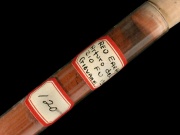Difference between revisions of "Ferric oxide"
(username removed) |
|||
| (6 intermediate revisions by 3 users not shown) | |||
| Line 1: | Line 1: | ||
| − | [[File:1992.400-SC115177.jpg|thumb|]] | + | [[File:1992.400-SC115177.jpg|thumb|Benin iron altar<br>MFA# 1992.400]] |
== Description == | == Description == | ||
| − | An insoluble dark red powder that occurs naturally as [ | + | An insoluble dark red powder that occurs naturally as [[hematite|hematite]]. Red iron oxide has been used since antiquity as a permanent red pigment in paints and glazes (see [[red%20ocher|red ocher]]). In the late 1700s, ferric oxide was manufactured as a red pigment. This synthetic, intense red pigment with a uniform particle size is now called [[Mars%20red|Mars red]]. Ferric oxide is also found in the form of [[rust|rust]]. Rust is a corrosion product that readily occurs on [[iron|iron]] and some [[steel|steels]] in the presence of [[oxygen|oxygen]] and moisture. Fine powdered ferric oxide, called [[Jewelers' rouge]], is also used as an [[abrasive|abrasive]] for [[glass|glass]], precious metals and [[diamond|diamonds]]. Ferric oxide is also the most common material used in magnetic coatings on audio and video tapes. |
[[File:120 iron oxide red.jpg|thumb|Ferric oxide]] | [[File:120 iron oxide red.jpg|thumb|Ferric oxide]] | ||
| + | |||
== Synonyms and Related Terms == | == Synonyms and Related Terms == | ||
ferric sesquioxide; jeweler's rouge; red iron oxide; red iron trioxide; ferric trioxide; Venetian red; Tuscan red; Indian red; Persian red; crocus martis | ferric sesquioxide; jeweler's rouge; red iron oxide; red iron trioxide; ferric trioxide; Venetian red; Tuscan red; Indian red; Persian red; crocus martis | ||
| − | == | + | == Risks == |
| + | |||
| + | * Overexposure to dust may result in x-ray shadows due to apparently benign lung pigmentation. | ||
| + | * Fisher Scientific: [https://fscimage.fishersci.com/msds/00795.htm MSDS] | ||
| + | == Physical and Chemical Properties == | ||
Soluble in acids. Insoluble in water. | Soluble in acids. Insoluble in water. | ||
| Line 22: | Line 27: | ||
|- | |- | ||
! scope="row"| Melting Point | ! scope="row"| Melting Point | ||
| − | | 1565 | + | | 1565 C |
|- | |- | ||
! scope="row"| Density | ! scope="row"| Density | ||
| − | | 5.12-5.24 | + | | 5.12-5.24 g/ml |
|- | |- | ||
! scope="row"| Molecular Weight | ! scope="row"| Molecular Weight | ||
| 159.69 | | 159.69 | ||
|} | |} | ||
| − | |||
| − | |||
| − | |||
| − | |||
== Comparisons == | == Comparisons == | ||
| Line 39: | Line 40: | ||
[[media:download_file_197.pdf|Properties of Common Abrasives]] | [[media:download_file_197.pdf|Properties of Common Abrasives]] | ||
| − | + | ==Resources and Citations== | |
| − | |||
| − | == | ||
* Richard S. Lewis, ''Hawley's Condensed Chemical Dictionary'', Van Nostrand Reinhold, New York, 10th ed., 1993 | * Richard S. Lewis, ''Hawley's Condensed Chemical Dictionary'', Van Nostrand Reinhold, New York, 10th ed., 1993 | ||
Latest revision as of 09:04, 2 August 2022
Description
An insoluble dark red powder that occurs naturally as Hematite. Red iron oxide has been used since antiquity as a permanent red pigment in paints and glazes (see Red ocher). In the late 1700s, ferric oxide was manufactured as a red pigment. This synthetic, intense red pigment with a uniform particle size is now called Mars red. Ferric oxide is also found in the form of Rust. Rust is a corrosion product that readily occurs on Iron and some steels in the presence of Oxygen and moisture. Fine powdered ferric oxide, called Jewelers' rouge, is also used as an Abrasive for Glass, precious metals and diamonds. Ferric oxide is also the most common material used in magnetic coatings on audio and video tapes.
Synonyms and Related Terms
ferric sesquioxide; jeweler's rouge; red iron oxide; red iron trioxide; ferric trioxide; Venetian red; Tuscan red; Indian red; Persian red; crocus martis
Risks
- Overexposure to dust may result in x-ray shadows due to apparently benign lung pigmentation.
- Fisher Scientific: MSDS
Physical and Chemical Properties
Soluble in acids. Insoluble in water.
| Composition | Fe2O3 |
|---|---|
| CAS | 1309-37-1 |
| Melting Point | 1565 C |
| Density | 5.12-5.24 g/ml |
| Molecular Weight | 159.69 |
Comparisons
Properties of Common Abrasives
Resources and Citations
- Richard S. Lewis, Hawley's Condensed Chemical Dictionary, Van Nostrand Reinhold, New York, 10th ed., 1993
- Robert Fournier, Illustrated Dictionary of Practical Pottery, Chilton Book Company, Radnor, PA, 1992
- The Merck Index, Martha Windholz (ed.), Merck Research Labs, Rahway NJ, 10th edition, 1983 Comment: entry 4072
- The American Heritage Dictionary or Encarta, via Microsoft Bookshelf 98, Microsoft Corp., 1998
- Michael McCann, Artist Beware, Watson-Guptill Publications, New York City, 1979
- Susan E. Schur, Conservation Terminology: A review of Past & Current Nomenclature of Materials, Technology and Conservation, Spring (p.34-39); Summer (p.35-38); Fall (p.25-36), 1985

